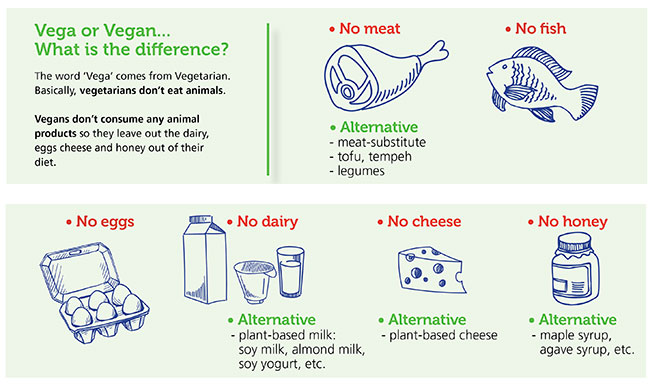
Plant-based and Vegan
February 20, 2020
By Jennifer LaPaugh
Consumer behaviour driving plant-based baking trends
 Image courtesy of dawn foods
Image courtesy of dawn foods Constant research and insights into the consumer trend landscape helps customers make more informed business decisions and better meet demands in the marketplace. Regularly identifying and refreshing corporate trend reports to provide a view on what’s happening in the marketplace, consumer behaviors, and macro influencers. This information helps create innovative ideas and thinking to consult bakers on opportunities to better meet consumer needs.
With our latest view to what’s trending, eight consumer trends were identified:
- Enlightened Eating
- Blissful Indulgence
- #Eatertainment
- My Food ID
- Transparency 360
- Mashup Adventure
- Just For Me
- Twenty-Five 7
“Baddies” out, “goodies” in
The Enlightened Eating trend details how people seek great tasting, pure, and simple products free from artificial ingredients. They seek foods that are loaded with nutrients to fuel their bodies and support a health-conscious lifestyle. People are eating healthier and seeking opportunities to get the “baddies out” by avoiding undesirable ingredients and replacing them with simple and pure ingredients. Additionally, they seek to get the “goodies in” by eating foods with added nutrients like fruits and veggies, protein, herbs and spices and ancient grains.
Younger consumers, like Millennials, associate health with plant-based and vegan diets. They are concerned with artificial, hard-to-pronounce ingredients, allergens, and animal products. Vegan has become more mainstream, as 84 per cent of consumers know about vegan and 39 per cent have tried vegan products. 1
For bakers, vegan and plant-based replacements can provide the dual benefit of protein and better color development. We know consumers have learned, and come to expect, that health doesn’t have to replace great taste. The ideal solution for bakers combines the best of both worlds with a balance of healthy and delicious.
Social media’s effect on consumers
With social media like Instagram and Facebook, individual who post regularly and have a strong following are known as influencers; they can drive sales from bakeries, confectioners and essentially anyone in the food industry that has eye-catching pictures or a strong online presence.
Influencers are more than just the “cool kids” in a high school who shape trends or drive the popularity of products. An influencer builds a following by building trust. How do they gain a following, and how can anyone in the food industry get on that bandwagon?
Using hashtags (#) to draw in readers and viewers to advertise or celebrate food is not new. Many bakeries, confections and fans of both have use the tag to call attention to holidays (#ValentinesDay), emotional states (#EatingMyFeelings) or to declare a personal opinion (#ChocolateIsBest).
The social media angle is not to be dismissed: Three separate trends, Blissful Indulgence, #Eathertainment and My Food ID are all interconnected and use online media to drive opinion or generate discussion. Websites and social media sites are filled with luscious images of decadent desserts, and social media posts (and re-posts) of the same. This creates a cascading effect of social media users posting their personal preferences, which creates an online profile, or a “Food ID” that consumers can relate to, or be identified by for marketing purposes.
For instance, health-conscious consumers may have a Food ID that uses hashtags like, “EatingClean” or “WholeFoodLiving” where someone who eats for pleasure would post a photo of brightly coloured doughnuts with the tag, #Eatertainment.

Image courtesy of dawn foods
“Transparency 360”
People have access to more information and knowledge than ever before and in return, expectations for food transparency are growing beyond ingredient quality.
More now than ever, consumers want details about a product’s supply chain including resourcing and production. Your customers want to feel good about supporting local businesses and buying products that are ethically sourced. Additionally, consumers also expect companies to prioritize sustainability.
Generation Z and millennials grew up with technology, and value transparency and access to detailed information.
- Younger generations have been nicknamed ‘food evangelists’ because they are a new class of empowered food critics who influence others through social media, driving transparency into the mainstream.
- 73 per cent of consumers feel better about food companies that are transparent about their products.
- 71 per cent of consumers now pay close attention to ingredients and want to know everything that’s in their food.
“Just for Me” and “Mashup Adventures”
Mashup Adventures features more than a combination of sweet and savoury. Today’s foodie adventure-seeker may look for cross-cultural flavours with surprising combinations and twists give people a low-risk way to be adventurous and have unique sensory experiences. This may be something like cheese paired with cocoa powder, or a German pastry stuffed with an Asian-inspired filling.
“Just For Me” highlights personalization, from personal preferences aimed at returning customers, or building a base of return customers by learning their food allergies and/or favourite flavours. Just For Me is not mutually exclusive from other factors; someone with a taste for a Mashup Adventure may have a Just For Me profile detailing their preference.
Twenty-Five 7
With the growing trend of food kits to save time on shopping and dinner planning, today’s consumer is fixated on time. Many Millennials and Generation Z consumers work more than one job, and time is at a premium.
Twenty-Five 7 refers to how many hours a day a the overworked feel they have experienced, instead of working Twenty-Four 7, today’s workers are burned out and looking for any way possible to save time. Consumers are looking to maximize the hours in each day. They look for easy, efficient experiences that won’t compromise food quality, and the perception behind plant-based foods is that it is less time-intensive food option.
1 Datassentials FLAVOR Study, 2019
Jennifer LaPaugh is the senior director, regional & artisanal channel marketing at Dawn Foods.
Print this page
Leave a Reply